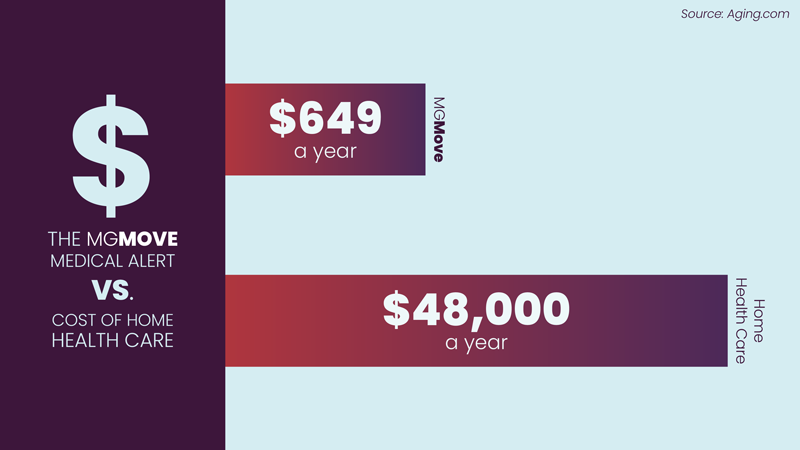This article shares the costs of home health care, the growing shortage of home health providers, and the use of medical alerts devices to help lower the costs, provide life balance for caregivers, and keep loved ones safe.
Right alongside the current labor shortage is a shortage of in-home health care providers. If you can find a home-care provider who’s available for hire, the cost may be too much for many people. This means the responsibility of care is shifted to family members who may want to care for a loved one but are not able to support the added responsibility and maintain essential employment. One solution: A medical alert device.
Cost of home-health care is high
With a sharp increase in demand and a shortage in labor, home health care costs are going up. However, even when considering the normal costs of in-home care, many families find the service too expensive to maintain. According to Aging.com the average cost of in-home care is $4000 a month, and that’s if you can find a caregiver who’s available.
The home-health-provider labor shortage has become so dire that the topic has reached mainstream media. In fact, the New York Times (NYT) just published an article titled, “Many of us want to age at Home but that option is fading fast.” According to the NYT, about a quarter of all home care patients in New York were unable to find workers to help and nearly 20% of the home care positions went unfilled due to staffing shortages.
Future projections for finding home-based care options don’t look much better. According to the article, Direct Care Workers in the United States, “Between 2021 and 2040, the [New York] state is projected to have nearly a million home care job openings, and the rest of the country is not far behind. But despite a surplus of unfilled jobs, many find that they simply can’t afford to do this type of work.”
What’s the alternative to hiring home-health care?
One article from Mcknights Home Care, Smartwatch could help alleviate caregiver crisis, suggests that a medical alert device could help lessen the demand on family members and lower the cost of hiring home health care providers. The article, which interviewed Medical Guardian CEO Geoff Gross, states the MGMove may “help older adults navigate barriers to living alone, such as memory loss, mobility and loneliness … and could also serve as a stopgap to home care firms and families struggling with the caregiver shortage.”
If families are unable to care for an aging loved one because, for example, they need to remain employed, medical device technology could be a more affordable and quick solution. While medical alerts traditionally offer an SOS button in case of a fall, the MGMove goes a step further by offering GPS tracking, voice-to-text communications with loved ones, a step counter, and calendar reminder alerts.
Adding the support of a medical alert device, like MGMove, could dramatically cut the cost of home care. When comparing the home health care cost of $4000 a month, the MGMove is a fraction of the cost at $199 plus a $39.95 service fee.
When is a medical alert device the right choice?
A medical alert device, like the MGMove, is for anyone at any age who wants round-the-clock protection or feels more secure when they are up and about for the day. (Read: How to tell if your parent needs a medical alert system.) Often we will hear from customers who purchased a device for someone recovering from surgery, living with a disability, or living alone. Considering Individual needs based on health, mobility, health factors, and how much care is needed plays a large part in making the decision between home health care and a medical alert device.
A medical alert device, like the MGMove, can bridge care gaps by providing 24/7 access to immediate help if needed. The most appealing option for many aging Americans is that a medical alert helps to extend their time living in their own homes, where they feel most comfortable. According to the AARP article, Despite Pandemic, Percentage of Older Adults Who Want to Age In Place Stays Steady, over 77% of adults 50 and over want to remain in their homes as they age.
Both caregivers and aging adults benefit from a Medical Alert device
While the difference in cost between hiring home care and a medical alert device is vast, we can’t put a price tag on peace of mind. Many caregivers tell us that they can maintain a better balance in their lives when a parent has a medical alert device. Knowing parents have access to immediate emergency response helps caregivers and families sleep better and maintain better life balance. Caregivers can remain employes and better care for their children, spouse, and home when they know the parents have an extra layer of protection with a device.
Are you considering buying an alert?
If you're considering a medical device for your loved one, please give us a call at 800-668-9200. We can provide protection both inside and outside of the home. We would be happy to discuss your options and help you find the device that fits best. Call 800-668-9200 for more information.

